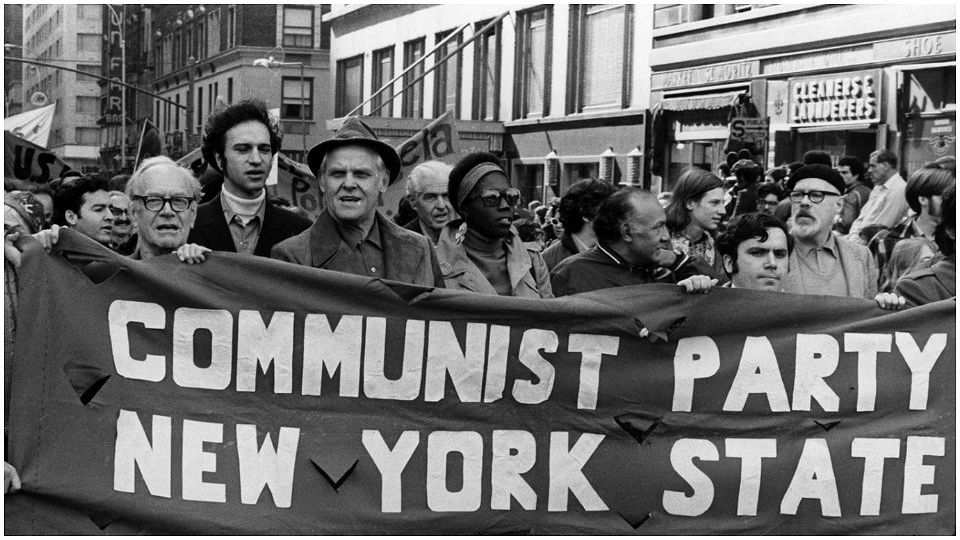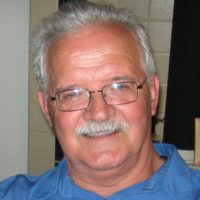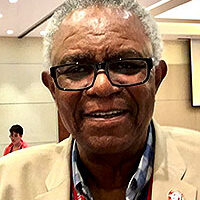
Gus Hall, former national chairman of the Communist Party, was interred at Forest Home Cemetery (formerly Waldheim Cemetery), near Chicago, Sept. 20. Gus and Elizabeth’s children, Barbara Conway and Arvo Hall, party leaders, and friends attended the ceremony. Carole Marks, who worked with Hall for many years, welcomed the attendees. CPUSA National Chairman Sam Webb and Executive Vice Chairman Jarvis Tyner delivered the eulogies. Their remarks are reprinted below.
Hall was one of the most famous American Communists, from founding member of the United Steelworkers of America (USWA) and a leader of the 1937 “Little Steel” strike to being one of 12 Communist Party leaders indicted on false charges under the unconstitutional Smith Act for which he spent eight years in prison. Hall made an indelible mark on the working class and communist movement in this country and worldwide. Hall was a working-class theoretician of Marxism-Leninism, the science of the class struggle. He wrote eight books and was working on another at the time of his death, Oct. 13, 2000.
Historic Waldheim Cemetery is famous for the many revolutionaries and working class leaders resting there. Hall’s remains were interred near the Haymarket Martyrs Monument, where the five murdered labor leaders, champions of the eight-hour day, are buried.
Hall may be best remembered for his unwavering support for socialism. “Life cannot go on forever without that step (to socialism), and setbacks don’t change it,” Hall once said. “Just as feudalism was an advance over slavery and capitalism was the next step after feudalism, socialism is the next step after capitalism.”
A reception was held immediately following the ceremony. The National Board of the Communist Party met the following day. Webb opened the meeting with a rededication of purpose in honor of Gus’ memory.
Remarks by Sam Webb, National Chair, CPUSA
We gather today to inter the ashes of Gus Hall – husband of our comrade Elizabeth, father, grandfather, comrade, and dear friend.
This earth in which Gus’s ashes will find a home is not hard, cold, and unyielding. Rather it is a site deeply imbued with the finest traditions of the working-class and socialist movement. It is a place to restore our historical memory of events and comrades of an earlier time and revitalize ourselves for struggles ahead. It is hallowed ground.
In this ground are the ashes of comrades and working-class militants who stood with Gus in thick and thin, shared his hopes and dreams, and considered him a legendary figure of the 20th century working-class struggle. So we are not saying a fond farewell to Gus, but entrusting his ashes to a familiar and precious place to which we will periodically return.
We will miss Gus’ presence, of course, but we will keep his memory alive. How can we forget such a wonderful human being and comrade? His footprints on events of the last century were deep and are still felt. He left his mark on each of us and each of us carries something of Gus with us.
His was a fulfilled life. I’m sure that he had a few regrets, but against the full range of accomplishments of his life, these regrets should inhabit little space in his biography.
Some will say, of course, that both Gus and his comrades must have felt profound disappointment in the twilight of their lives as the possibility of socialism in their lifetime dimmed from their view.
On the surface, I guess it might be easy to think that, but actually there is no truth to it. Like the African-American patriot Crispus Attucks who was the first to lay down his life for his country’s independence, … like the soldiers at Gettysburg that Lincoln eulogized so eloquently and whose blood still consecrates those fields, … like the young volunteers from Chicago and elsewhere who fought fascism on Spanish soil and whose remains are still there, … like Joe York and three other Ford hunger marchers who were struck dead by Ford bullets and lie in Woodmere cemetery in the shadow of the River Rouge plant, … like the great revolutionary democrat, Martin Luther King, Jr., who shortly before his life was cut down by an assassin, prophetically said that he might not get to the “promised land,” … and like Cesar Chavez, the Mexican-American trade union and people’s leader, who gave every ounce of energy to the struggle against the giant agribusinesses that still dominate the factories in the fields, … like all of them … Gus and the other comrades buried in this hallowed ground never gave in to despair about the unforeseen turns of the struggles to which they devoted their lives.
They neither expected nor asked for any promissory notes that guaranteed that the full fruits and ultimate aim of their struggle would be enjoyed by themselves and their generation.
They understood in their minds and in their guts that the struggle for freedom promises no easy victories, but rather demands unrelenting struggle, sometimes for even an inch of progress. Gus and his comrades were not summer soldiers.
A full measure of Gus and his comrades’ work can’t be gained by simply asking, “Did they see socialism?” In fact, a measure of their contributions to the struggle for a just world can only be obtained by appreciating what they were up against, the barriers that they had to overcome, the sacrifices they had to make, and the new vistas of freedom that they opened up on the road to democracy and socialism.
By that measure, theirs was a life lived well. Indeed, I would say that if a new birth of freedom is going to gain sway over the militarist polices of the Bush administration that are pushing the world to catastrophe, we would do well to solidly fix our feet on the shoulders of Gus and Winnie, Gurley Flynn and Foster, Helen and Carl and the other legendary comrades buried here.
They left us with an unfinished agenda to be sure, but they also brought us to higher ground. Let us be inspired by their example, learn from their experience, and carry on in their unrelenting spirit of struggle.
Remarks by Jarvis Tyner, Executive Vice Chair, CPUSA
Today we inter the remains of a great revolutionary … a leader of our Party … a Communist in the purest sense of that word.
For 40 years Gus was an outstanding leader of the Communist Party USA, during which time he distinguished himself as one of our movements greatest thinkers. His speeches and writings are still read and studied by people – not just communists – all over the world.
He was a fantastic organizer who led the party from the staggering blows of the McCarthy cold war era, through the Civil Rights upsurge, the campaign to end the war in Vietnam and the revival of the public role of the Party.
I still remember his speech to thousands of students at the University of Oregon. Then there were the four times he ran for president on the Communist Party ticket, where I had the honor of being his running mate in two of them.
Gus convinced us all that the Party could be a public party and he showed us how to do it in a mass, popular way – how, in his words, to “reach the millions.”
Because of his leadership we are stronger and wiser as a party and can withstand the most difficult circumstances.
Through it all, he never faltered. He never retreated from the basic principles of our Party or defending the working class. Gus never retreated in the battle against American Imperialism, the struggle against racism and for Black, Brown and white unity.
It’s appropriate to say again, thank you Gus Hall!
We also say thank you to the family of Gus Hall – to Elizabeth, to Barbara and Arvo for your sacrifices and contributions to the cause of Gus’ class and party.
We are here to place Gus’ remains in this sacred place where he will rest beside Henry Winston, William Z. Foster, Elizabeth Gurley Flynn, Carl and Helen Winter, Big Bill Haywood, Claude and Geraldine Lightfoot, Art and Esther Shields.
His remains will have a resting place now, a place where we can visit and remember his many contributions, not only to our Party, but to our nation and the world.
Gus was like a father to many of us. We loved him dearly and will strive to live our lives as he lived his.








